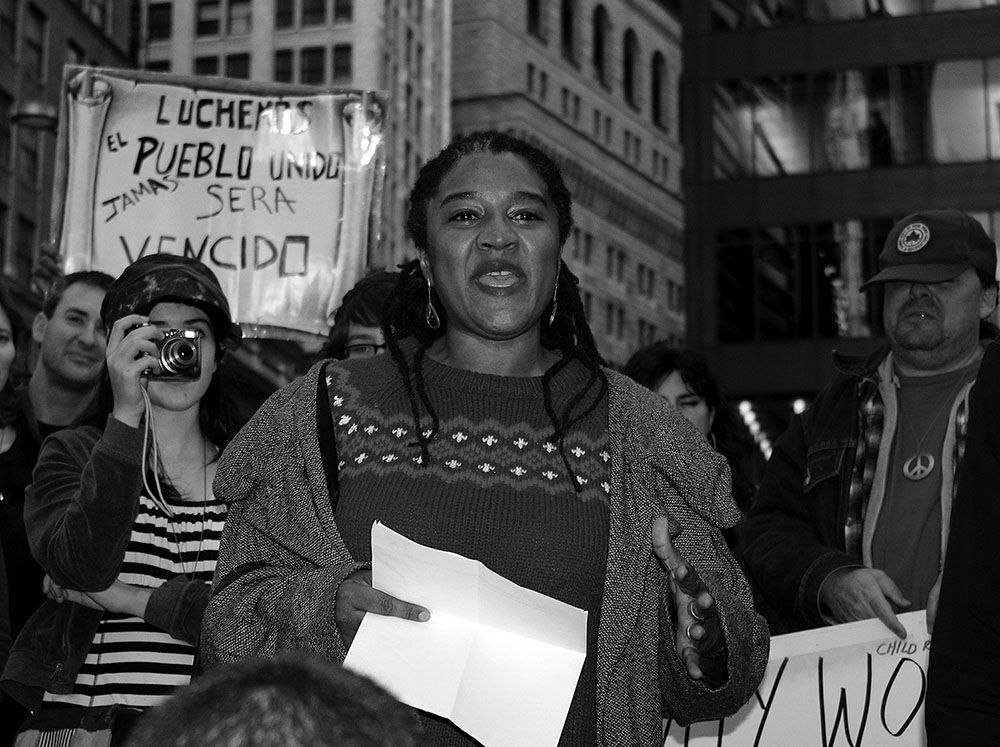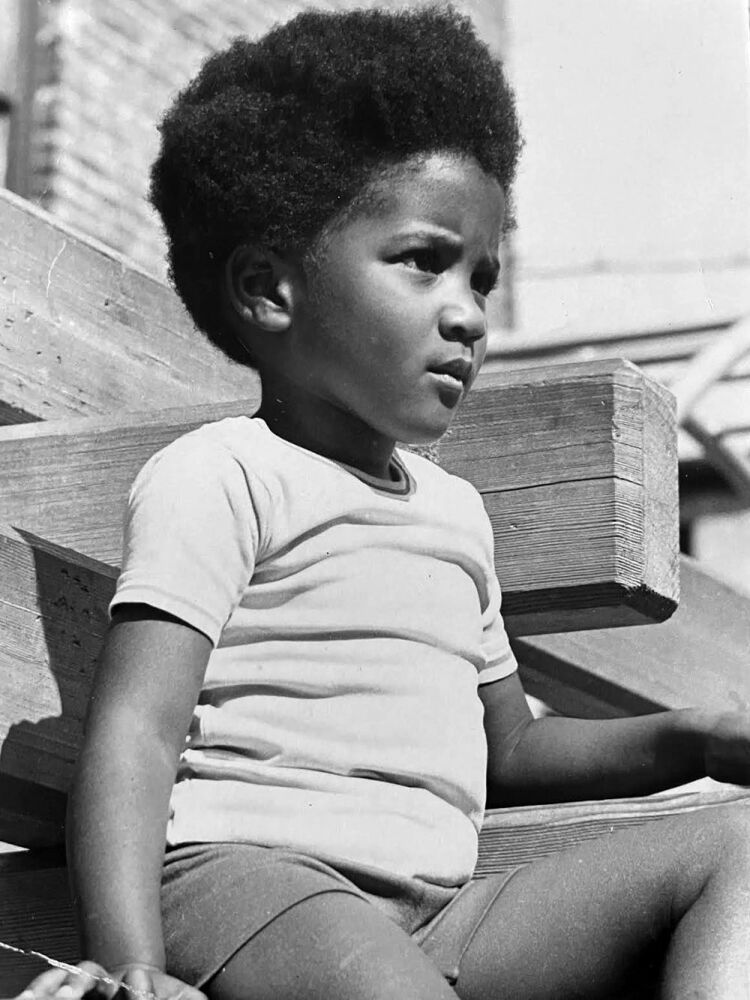Issue 245, Fall 2023

At an Occupy Wall Street rally in Zuccotti Park, 2011. Photograph by David Shankbone, public domain, licensed under CC0 1.0; page 67, courtesy of Lynn Nottage and Granary Books.
Lynn Nottage is one of the most successful playwrights in American theater. She is the only woman to have won the Pulitzer Prize for Drama twice—in 2009, for Ruined (2008), a portrait of a group of women living through civil war in the Democratic Republic of the Congo, and in 2017, for Sweat (2015), about the aftermath of a steel-mill closure in Reading, Pennsylvania—and is among the most-produced dramatists in the country. Last year, her fans celebrated a “Nottage trifecta”: for four days in January, three of the playwright’s works were staged concurrently in New York City. The opera Intimate Apparel (2020), adapted from her 2003 play of the same name about a Black seamstress in turn-of-the-century Manhattan, was at the Lincoln Center Theater; her feel-good comedy Clyde’s (2019, originally titled Floyd’s) was at the Hayes Theater; and MJ the Musical (2022), a jukebox show about Michael Jackson for which she wrote the libretto, was at the Neil Simon Theatre. The latter was nominated for ten Tony Awards and has grossed more than $120 million, with a total attendance of nearly nine hundred thousand. Nottage’s plays have been performed all over the world—Japan, Peru, Germany, Iran, Chad—and her current projects include an adaptation of Fannie Hurst’s 1933 novel Imitation of Life with music and lyrics by John Legend, directed by Liesl Tommy, and “The Highlands,” an opera, with the composer Carlos Simon and Nottage’s daughter, Ruby Aiyo Gerber.
From 2001 to 2014, Nottage taught at the Yale School of Drama, and she is now a professor of theater at Columbia University School of the Arts. Despite her many commitments, Nottage appeared relaxed during our conversations, which began on Zoom in the early days of the pandemic and continued in person at the brownstone in Brooklyn where she lives with her husband, the documentarian Tony Gerber, and where she and I sat amid artworks by Elizabeth Catlett and Kehinde Wiley. Nottage, who was born in 1964, grew up in this house. Her mother was a schoolteacher and an activist, and her father was a psychologist for the state, specializing in juvenile rehabilitation. When Nottage was sixteen, she was selected to participate in Stephen Sondheim’s Young Playwrights workshop, as part of a cohort that also included Kenneth Lonergan. After graduating from Brown University, she went directly to study at Yale, where she wrote several political plays and became involved in protests on campus, staging interventions during prospective-student tours that called attention to the university’s slaveholding history. She then spent four years working at Amnesty International before returning to writing.
Paula Vogel, one of Nottage’s teachers and advocates at Brown, once said to me that the best playwrights become their own adjective. When I asked Nottage to characterize a Lynn Nottage work, she told me, “In all my plays, I’m trying to figure out how someone who feels marginalized, invisible, can at the same time be powerful and self-possessed. My characters are fighting to be seen in a world that fundamentally doesn’t want to recognize their power.”
INTERVIEWER
I think I got the last ticket for MJ in the house. A balcony seat.
LYNN NOTTAGE
Were people rowdy?
INTERVIEWER
Oh yeah.
NOTTAGE
The show is the show. We wanted MJ to be people’s gateway drug, for them to leave thinking, I love Broadway.
INTERVIEWER
I was standing in line to get in behind this group of women from Long Island—who, by the way, were all in their “Thriller” jackets—and two of them had seen it three times already.
NOTTAGE
There are New York theater artists I’ve noticed sitting in the audience five times. It’s because the show offers the same jolt of adrenaline as you get on a thrill ride. While I was writing, I was asking myself, What is the equivalent of the kick line these days? You know, that moment designed to dazzle and delight. I’ve loved watching the ushers during “Thriller”—they hear the opening bars and scramble up from the lobby to watch.
INTERVIEWER
How did you prepare to write the show?
NOTTAGE
There was a long research process. I interviewed dozens of people who had known Michael—people who had written his songs, worked with him in the studio, and danced on his tours. I wanted to discover the anecdotes and details you weren’t going to get anywhere else, like how good he always smelled. Something that intrigued me about Michael was how exacting he was. He was never confrontational, but that doesn’t mean he wasn’t forceful. He asserted himself in ways that were gentle but precise. Finding a way to dramatize someone who doesn’t express their emotions and desires overtly, yet always manages to get what they want, was one of the biggest challenges. I admit that the first draft of MJ was an embarrassment. Maybe the second and third ones, too. I mean, how do you distill a life as complicated as Michael Jackson’s into two and a half hours of engaging theater?

At a playground on Pacific Street in Brooklyn, ca. 1968. Courtesy of Lynn Nottage.
INTERVIEWER
MJ reminded me of the class of yours I took at Yale, American Spectacle. How did that course come about?
NOTTAGE
In the early aughts, when I started teaching, the theaters producing my plays continually wanted to put them in a box—a literal box, on the proscenium. Most academics and practitioners weren’t acknowledging the different forms of theater happening all over New York City, and how those forms were in conversation with the way we as playwrights make our work. American Spectacle has always begun with a field trip to the Coney Island Circus Sideshow, which is probably one of the longest-running sideshows in America right now. We also go to vogue balls, courtroom trials, and megachurches. The event that the students especially love, which I never would have anticipated, is wrestling. The athletes are master storytellers, and in some cases brilliant actors. What I’ve witnessed is that, by the end of the course, all the students, even if they began as very naturalistic, structurally conservative writers, are making work that is more playful, inventive, and open.
INTERVIEWER
How do you feel about outlines? Do playful plays need them?
NOTTAGE
When I was at Yale, some of my peers believed that strict outlining would inhibit the freedom of discovery, but I found that the playwrights I admired the most in the program were the ones who knew where they were going to begin and end. Back then, I was a little bit free-form, though I developed a technique where I’d walk through the whole play in my head. I still do that, which is how I’m able to write quickly when I finally sit down at the computer. It’s because I’ve spent time thinking about the architecture of the storytelling, about who and where my characters are as they move forward. That said, I tend to find a different organizing principle for each play. For MJ, it involved inviting the audience into Michael Jackson’s process—by focusing on two days during rehearsals for the Dangerous world tour as he builds a set list that then takes shape as a mixtape of his life. In the case of Intimate Apparel, all the scenes are two-handers, and each is set in a boudoir or a bedroom. I was interested in how people interact when they’re in an intimate space, and how proximity affects the nature of relationships. Sweat had three organizing principles. The central action is set over the course of a year, and takes place in a bar. As it progresses, the three women in the play celebrate their birthdays there—and with each party we see the slow deterioration of their friendship. And, finally, in each scene a character gets an aria, a moment to speak their truth.
INTERVIEWER
At what stage in the process does that architecture emerge?
NOTTAGE
It’s part and parcel. I have a theory that we all write in the way we lived our lives as children. Take someone like Suzan-Lori Parks, who was an Army brat and lived all over—her plays are free-form, unencumbered. You don’t feel the dome of conformity around them. Then there are people who grew up in small, tidy apartments, and as such their writing is spare and unadorned. And there is someone like me, who grew up in a brownstone with rooms of varying sizes that were cluttered with eclectic stuff, a lifetime of belongings—as a result, I write plays that are architecturally sound but packed with unexpected things.




